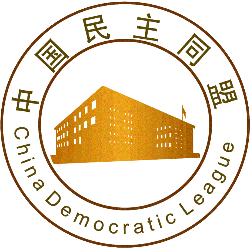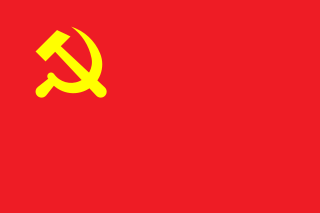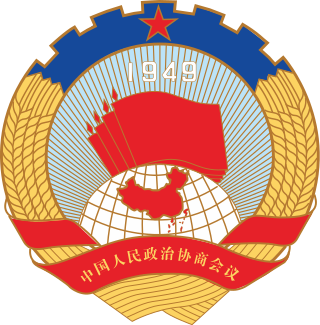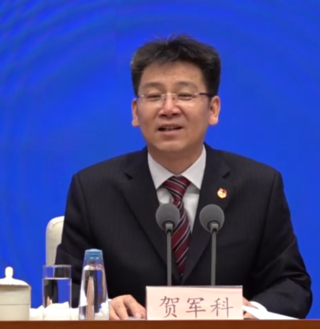Bourgeois liberalization is a term used by the Chinese Communist Party to refer to either the prevalent political orientation of Western representative democracy or mainstream Western popular culture. The late 1980s saw the first major usage of the term when a number of campaigns, such as the Anti-Spiritual Pollution Campaign, against bourgeois liberalism were initiated lasting until the early 1990s. The term is in active use in Chinese politics, with the Communist Party's Constitution stating party objectives include "combat[ing] bourgeois liberalization" in line with the four cardinal principles. According to the Chinese Communist Party, the concept of bourgeois liberalization was first proposed by Deng Xiaoping, the paramount leader of China, in early 1980s.

The Revolutionary Committee of the Chinese Kuomintang is one of the eight minor political parties in the People's Republic of China under the direction of the Chinese Communist Party.

The China Democratic League (CDL) is one of the eight minor political parties in the People's Republic of China under the direction of the Chinese Communist Party. The CDL was originally founded in 1941 as an umbrella coalition group of the Chinese National Socialist Party, the Chinese Youth Party and the Chinese Peasants' and Workers' Democratic Party to fight the Imperial Japanese Army while providing for a "Third Force".

The China National Democratic Construction Association (CNDCA), sometimes translated as the China Democratic National Construction Association (CDNCA), also known by its Chinese abbreviation Minjian (民建), is one of the eight minor political parties in the People's Republic of China under the direction of the Chinese Communist Party. It is the third-ranking minor party in China.

The China Association for Promoting Democracy (CAPD) is one of the eight minor political parties in the People's Republic of China under the direction of the Chinese Communist Party. The party is a member of the Chinese People's Political Consultative Conference. It was formed on 30 December 1945, and mainly represents high-level intellectuals engaged in education and cultural publishing media.

Deng Yanda was a military officer in the Chinese Nationalist Party. He broke with party leaders in 1927, denouncing them as traitors to the party's original principles and in 1930 attempted to form a new party, which he called the Provisional Action Committee of the Chinese Nationalist Party or Third Party. It was later renamed the Chinese Peasants' and Workers' Democratic Party. In 1931 he was convicted of treason by the Nationalist government and secretly executed. Today, Deng is recognized as a revolutionary martyr by the People's Republic of China.

The 10th National Congress of the Chinese Communist Party was held in the Great Hall of the People, Beijing, between August 24 and 28, 1973. 1,249 delegates represented the party's estimated 28 million members. It was preceded by the 9th National Congress and was succeeded by the 11th National Congress.

The 2nd National Congress of the Chinese Communist Party was held in the Shanghai International Settlement at the apartment of Li Da of 625 Pude Lane, South Chengdu Road, between July 16 and July 23, 1922. The congress was attended by 12 representatives, representing 195 members of the Chinese Communist Party (CCP). The congress succeeded the 1st National Congress of the Chinese Communist Party and preceded the 3rd National Congress of the Chinese Communist Party.

The Chinese National Peasants' Association, otherwise known as the Chinese Peasants' Association, was a peasant organization created in 1927 with the specific aim of transforming the peasantry via Socialism. It was led by the Chinese Communist Party until its dissolution in 1964. Its successor was the Chinese National Poor and Lower-Middle Peasants' Association, created in 1964 and dissolved de facto in 1986.
The 35th anniversary of the founding of the People's Republic of China took place on 1 October 1984. A military parade was held in Tiananmen Square in Beijing and various celebrations were conducted all over the country. China's paramount leader Deng Xiaoping inspected the troops along Chang'an Avenue in Beijing. This parade was immediately followed by a civilian parade.

The Committee for Agriculture and Rural Affairs is one of ten special committees of the National Committee of the Chinese People's Political Consultative Conference, China's top political advisory body and a central part of the Chinese Communist Party's united front system.
The Presidium of the 20th National Congress of the Chinese Communist Party was elected by congress delegates in a preparatory meeting before the convening of the congress. The Presidium of the 20th National Congress leads the organisation and the agenda of the aforementioned congress.
The Qualification Review Committee of the 20th National Congress of the Chinese Communist Party was elected by congress delegates in a preparatory meeting before the convening of the congress.
Yin Yong is a Chinese banker and politician who is the mayor of Beijing, in office since 28 October 2022. Previously, he served as deputy party secretary of Beijing, vice mayor of Beijing, and vice governor of People's Bank of China.
Fu Hua is a Chinese politician who is the current president of Xinhua News Agency, in office since June 2022.

He Junke is a Chinese executive and politician, currently serving as party branch secretary of the China Association for Science and Technology since May 2023. He previously served as first secretary of the Secretariat of the Central Committee of the Communist Youth League of China and director of the National Working Committee of the Young Pioneers of China.
Song Yushui is a Chinese judge and politician who is the current vice chairwoman of the All-China Women's Federation.

Anti-bourgeois liberalization as a political slogan of the Chinese Communist Party (CCP), it was proposed by Deng Xiaoping and others in the early 1980s. As a political movement against "bourgeois liberalization", it started at the CCP Congress held in Beijing in September 1986. The Sixth Plenary Session of the Twelfth Central Committee of the CCP was officially launched in early 1987.











